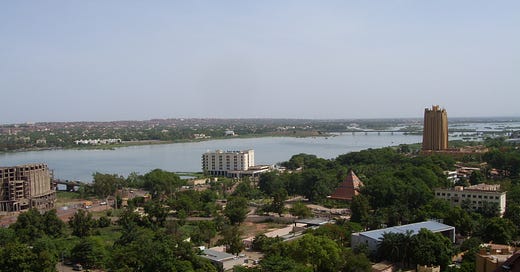Political repression escalates in Mali as junta shuts down all political parties
And ‘everything seems to be falling apart’ in the fight against militants
The Malian military junta’s dissolution of all political parties on Tuesday embodies the intensifying political repression in the violence-wracked West African state.
This follows the kidnappings of two pro-democracy activists and the attempted kidnappings of two others, as well as a knife attack on a fifth activist and threats against other campaigners. Opposition figures say these events constitute a “strategy of terror”.
The Malian regime appears spooked by protests in the capital Bamako in early May demanding free multi-party elections. These demonstrations arose after the transitional government recommended interim President Assimi Goïta stay in power without a popular mandate until 2030. The protests have fizzled out amid the repression.
“Protests calling for a return to democracy this month must have really shaken [the junta] up — hence they’ve done the knee-jerk, blunt move of dissolving political parties,” Will Brown, a senior fellow in the Africa programme at the European Council on Foreign Relations, told World Politics.
France’s quagmire
The Malian regime took power in the 2020 coup that deposed elected president Ibrahim Boubacar Keïta (known as IBK). The coup followed years of jihadist violence that saw vast swathes of Malian territory elude the central government’s control, despite military support from the former imperial power France.
Bamako asked Paris to intervene militarily in 2013, after Islamist militants took control of Mali’s desert regions in the north and were poised to seize the country’s central heartlands. In an age of inept Western interventions, Operation Serval was a textbook operation, routing the rebels, killing three of their five commanders and forcing the other two to flee.
Operation Serval turned into Operation Barkhane in 2014. This was a lot less successful. Unlike Serval, Barkhane didn’t have clearly defined, measurable goals; the purpose was to manage and minimise jihadist menaces. Islamist violence remained pervasive as the operation dragged on — indeed it spread to neighbouring Niger and Burkina Faso.
The death of 13 French soldiers in a helicopter crash in late 2019 was a turning point. As the French armed forces’ biggest single loss of life since the 1983 Beirut barracks bombings, it was the moment when French public opinion started seeing Barkhane as a quagmire.
The 2020 coup sparked tensions between Paris and Bamako. But it was the second coup in 2021 — when Goïta’s junta deposed the interim president, PM, and defence minister — that prompted Emmanuel Macron to announce France would wind down its mission.
Then the January 2022 revelation that Russian Wagner Group mercenaries had deployed to Mali caused uproar in Paris — and the last French troops left the country in August that year.
After the independence wave in the ’50s and ’60s, a neo-imperial clientelism known as the Françafrique characterised Paris’s relations with its former African colonies; an approach embodied by the fox-like Jacques Foccart, chief Africa adviser to successive occupants of the Élysée Palace.
Every French president since Jacques Chirac — Macron especially — has been determined to consign the Françafrique to history and avoid any association with those practices. But historic resentments endure for many in Francophone Africa.
Rightly or wrongly, many in Mali associate democratic politicians such as the late French-educated IBK with the old Françafrique model. This explains why the junta thinks dissolving political parties will not arouse a huge amount of public anger, said Ulf Laessing, Bamako-based head of the Sahel programme at the Konrad Adenauer Foundation.
“The government expects no repercussions as political parties in Mali have a poor reputation linked to the old elites which have ruined the country and were linked to France,” Laessing told World Politics.
‘A complete disaster’
Nevertheless, there are also many Malians who want a return to the country’s democratic traditions, forged after the 1991 coup that ended Moussa Traoré’s 23-year dictatorship and paved the way for multi-party elections the subsequent year.
“There are strong civil society and democratic traditions in Mali,” Brown noted — expressing his “doubt” that Malians are “going to stand for” the junta’s shutdown of all political parties.
The regime’s democratic backsliding and pivot from France to Russia have hardly improved the security situation.
Most notably, an attack by al-Qaeda affiliates Jama’a Nusrat ul-Islam wa al-Muslimin (JNIM) in September sowed chaos in Bamako, long thought of as the safest place in Mali. JNIM militants attacked multiple targets in the capital, including an elite academy for police trainees. Some 100 people were killed, according to an authenticated document seen by AFP.
There have been “some limited successes”, Laessing said, but “security across Mali remains poor”.
In addition to JNIM, Malian security forces are battling ISIS, several tough Tuareg separatist groups in the north, and miscellaneous organised crime outfits.
“They are fighting on multiple fronts with overstretched supply lines against a pretty intimidating range of foes,” as Brown put it. “Morale is pretty low and while the situation isn’t as bad in Mali as it is in neighbouring Burkina Faso, it’s pretty clear that neither the junta in Bamako nor their friends in Moscow have any answers.”
The junta’s amplifying political repression has moved Mali even further from its former allies in the West and regional bloc ECOWAS. The regime is increasingly isolated, relying on friendships with the similarly embattled Nigerien and Burkinabé juntas, plus a Russia focused on its war against Ukraine. France is unlikely to help a second time.
“Paris recognises there have been very bad problems in the relationship but also feels they’ve been treated pretty appallingly after sacrificing blood and treasure trying to hold the insecurity back in the region for so many years,” Brown noted. “The Russians have moved into being the new main international security guarantor for the Sahelian regimes but as anyone can see, it’s a complete disaster. The Russians are at the limit of what they can offer and everything just seems to be falling apart.”


